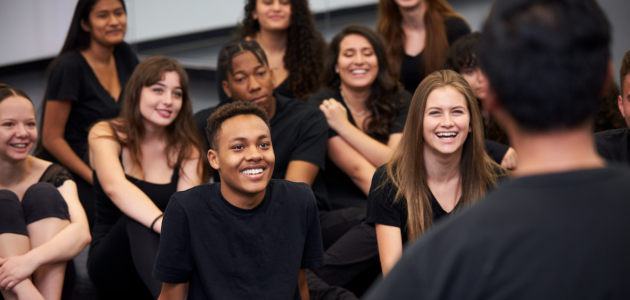
How to Develop your Acting Skills
Acting is a skill. Like most skills it’s aided by natural talent, but that’s not enough. So how do you develop your acting skills and become the confident, captivating actor that you dream of? By the end of this article you’ll have some techniques under your belt to help enhance your acting skills, regardless of where you are at in your career. None of the work outlined in this article requires spending a great deal of money, but it does require dedicated and focused effort.
For those of you that think you can’t work on your acting everyday, this is how. I’m going to cover all the major areas of acting work including: voice, movement, knowledge, text work and acting.
Every element is important and helps you become a more engaging and versatile actor. Enjoy!
Updated 8th September, 2022.
Voice

Your voice is one of the few tangible assets you have as an actor. It’s your resonance, breath support, articulation, and expression. Just as a musician might practice scales, or a dancer warms up their body before a performance, actors must strengthen the instrument of their voice! If you want to be able to tackle the language of Shakespeare, or the emotional demands of Arthur Miller, you need a voice that strong, flexible and connected. Voice work is the most neglected area of acting training by young actors (especially in an age when the dramatic whisper is all the rage on streamed film and TV), but I am hoping to change that outlook today. That is why voice work is number one on this list!
#1 Why Voice is Important
You want your voice to be flexible enough to embody any character that’s thrown your way. Can you play a powerful, high status character? Can you play someone with a strong accent? Can you play a character who speaks twice as fast as you without the lines being minced into gibberish? Voice is key to unlocking a world of characters and different ways of bringing them to life for an audience. Using your natural voice might work for a little while, but eventually you’ll need to diversify your vocal talent in order to book more jobs, and more varied roles.
#2 Voice Warm Ups
Voice warm-ups come in all shapes and sizes. The key is to find the exercises that work for you. It’s always best to put together a warm-up based on advice from a professional voice coach, or from a voice class you’ve taken. However, you’ll often find that you can pick up some great warm-up ideas from other actors you work with: what is their warm-up routine like? See anything good that might work for you?
The key to voice warm-ups is that consistency trumps effort. Doing 5-10 minutes a day is better than 1 hour long session each week. If you want to develop your acting skills, I recommend doing something every morning (maybe give yourself Sunday off).
Remember: Doing something everyday is better than doing one big voice session once a week or once a month.
#3 Articulation Exercises
Articulation is one skill that is often neglected, and yet it is incredibly beneficial to work on daily. Add 5 minutes of articulation exercises into your vocal warm-up every day. Take the time to work on particular sounds that you struggle with, and always work with a piece of text. It could be Shakespeare, Brecht, Annie Baker or Kenneth Lonergan—choose something that inspires you.
Idea: Get some help! I have an articulation vocal warm up I listen to on Spotify. Each morning I flick it on and just do that for 3 minutes. Having someone talk me throughout the exercise helps keep me accountable. It’s good fun, and seriously annoys my housemates.
#4 Work on Text
We will talk a little more about text work later, but remember you are working on voice to improve how you work on text. So: speak some great text out loud everyday! Have a go tackling a great poem, or dramatic piece of text like a monologue. Set yourself the goal of working through Shakespeare’s sonnets, or something else from the canon you’d not normally encounter. I believe regularly reading wonderful writing out-loud everyday is one of the most enriching things you can do as an actor.
For more on voice work.
Movement

Like with voice, you don’t want your own physical habits and tensions to inhibit you when it comes to developing unique and nuanced characters. If you can work from an aligned, grounded and relaxed starting point physically, you can explore the likes of Richard the Third as well as a laid back surfer from LA with ease.
#1 Why Movement is Important
Movement is one of the areas of acting you can work on daily and see a noticeable improvement very quickly. It’s the work that will allow you to be a more relaxed and expressive actor. I can’t stress how important movement work is for actors. Freeing the body also frees the mind, and the less limitations you have physically the more open you are to opportunities, ideas and direction.
#2 Movement Exercises
Physical exercise doesn’t always mean a work out at the gym (although this is a really important part of an actor’s health and fitness). Your daily movement practice could come in the form of Yoga, Pilates, Alexander, Feldenkrais or even Tai Chi. Like with voice work, a consistent 5-10 minutes a day is far more powerful than one hour a week. And again, like with voice, working with a dedicated movement coach is a great idea to put you on the right path.
#3 Semi-Supine
If you still haven’t found the movement practice that works for you, I would take a look at doing 10-20 minutes a day in semi-supine. Basically, this is an incredible position to recover from the day: you lie on your back with your knees bent, your feet flat on the floor and your head supported by a small book or equivalent. It helps with alignment, breath, relaxation and is just the best! One acting teacher told me 20 minutes in semi-supine is equivalent to an 8 hour sleep!!! More on semi-supine.
For more on improving movement.
Knowledge

There are many great actors who probably don’t read the StageMilk recommended 8 plays a week. But all great actors have a knowledge of the craft, and an undeniable eagerness to keep expanding that knowledge. They are aware of the industry and the stories they tell. My belief is the more you read, watch, and engage with the world of acting, the better you become. Expanding your mind and challenging yourself is vital.
#1 Read More Plays
Reading plays is an invaluable habit to form. Yes, it can often feel like a chore (and you’re sure to read more you endure through than fall in love with), but it’s one that will improve your acting skills. The more you read, the more you get to know different writers, characters, devices and become more well-versed in style, genre and language. All great actors have an undeniable eagerness to keep expanding their knowledge.
Read: 20 Must Read Plays
#2 Watch More Theatre, Film and Great TV
When did you last watch a play? I bet it was a while ago … unless your friend forced you to watch their latest one-man show about moving to LA to be an actor. If you want to be an actor and you’re not watching great plays, films and TV then you need to begin: right away! Immerse yourself in what’s happening, and what has come before. You can’t expect to be a part of an industry you’re not even engaging with. Push through and challenge yourself. Some of what you watch will be awful, but you will often find you learn more from the bad stuff than the good.
#3 Read Acting Books!!!
The first two suggestions are pretty easy. Reading a great play, or watching a TV show—that’s some of the best homework you will ever get. Reading an acting book, however, can be a tougher ask. They can be really cerebral and often quite dry. However, having a solid understanding of the main acting methodologies is so powerful, so just do it. That influx of knowledge is invaluable, and you will definitely see the results in your acting. Check out some of the best acting books of all time.
Text
In a lot of ways, acting comes down to this: how you bring a text—a character, a world, a story—to life and make it feel real. It’s tied into your voice work, but also more specifically about your unique interpretation of text off the page. Finding range and detail with dialogue is a skill that can set you apart from all the other actors. This is especially important when working on Shakespeare and other great classics. How much dynamism and colour can you give a monologue or scene?
#1 Learn a Monologue
Actors often think they can’t work on their acting alone. Fact is, we can work on the individual skills of acting everyday, and we can do it solo if we have to. Want to get better at acting Chekhov? Learn and work on 2 Chekhov monologues this week. Learn them, do the prep and then get anyone you can find to watch your work. It’s tough to motivate yourself to do this kind of work, but stretching yourself will pay off.
For more: Monologue Library
#2 Read Out Loud
Hopefully you are going to start reading more after this article: plays, novels, short stories, poetry. Then next stage is to read out loud. If you can read out loud you will get so much more confident with text. (And not to mention your cold reading audition skills will go through the roof!) I try to read something out loud every morning. I currently have a copy of Hamlet next to my bed and I get up and read a monologue or scene. It’s great for your acting skills, but also affirming for your confidence and your career. You are telling the day that you are an actor, and that acting is your first priority!
Read: Why I read out loud every night
#3 Learn how to Read a Script
I promise I’m not being condescending when I say too few actors really know how to read a script off the page. Practice your skills in analysis and interrogation: ask yourself what the writer intended, how the language is working and what choices can be made to inform the character/world/story? Script analysis helps you determine things like your character’s objective, how to plot your way through the actions of the scene and where your most interesting choices can be made to make the scene truly yours.
Read: Script Analysis: How to Get the Most out of a Scene
Acting
Finally, we come to the acting. The most intangible of all skills (supposedly). There’s no other way to refine your acting technique than by doing: working on scenes and monologues, doing Plays, Film and TV. But we don’t always have the opportunities to do these things the level we would like. However, there are some basics you can work on regularly which help to build connection, presence, storytelling and listening.
#1 Work at It
Work. Working on your craft is how you get better. That could be in a class or on a production. The key is to always be learning. Aiming for perfection doesn’t work: you will never be ‘finished’ in your quest in how to act! (Terrifying, I know.) Like any artistic pursuit, becoming a better actor is about becoming more open, honest and vulnerable. So get out there and hustle up some work! It doesn’t have to be paid, professional work. Work on a scene with a friend, or join StageMilk Drama Club and work with our amazing community. But just try to pick up scripts as often as possible!
IDEA: Find 2-5 acting mates who you know are passionate. Make a plan to get together once a week and put down new scenes or monologues. If you can do this regularly and help keep each other accountable, the quality of your work is going to skyrocket!
#2 How to Act (A Process)
Having a process is vital. Sometimes you will look at a script and it’s completely overwhelming. You have no clue where to begin, how to delve into the character and so you can’t make any progress. That’s where having your own process will help. This will be refined over the years, and you can keep updating it as you go. It might change and evolve on each production you work on, but it’s a structure and it’s a starting point you can keep coming back to.
I’d recommend getting yourself a binder folder and organising your notes from class, printed articles from StageMilk or other sites (which inevitably won’t be as good.) Keep revisiting this folder, and use it to develop your own process and structure for the next time you approach a new role.
You should constantly refine and interrogate your process. Maybe try working on a few pieces where all you do is learn the lines, and then look at another where you do the full 12 steps of Ivana Chubbuck and just see what feels good? Your process is so important as an actor, especially when it’s a process that you, yourself, have worked to develop.
#3 Work on you!
There are a number of acting teachers, from Stella Adler to Anthony Meindl, who talk about improving your acting skills by improving YOU. Start living life, people! As actors, we have to express the most profound stories and embody the most heightened characters. How can you do that if you life is working 9-5 in a mundane job and watching TV and going to pub once a week? Explore yourself, travel, take risks and be bold in life, to be bold on stage.
And if this sounds easier said than done, that’s an entirely fair point. Not everybody can afford to leave their office cubicle to explore the other side of the world. So find ways to make the everyday extraordinary: experience new art, start a fresh hobby, connect with friends and family, walk a new way home from work. Working on you, as an actor, is about broadening your experiences, not making them grander.
Where to Practice your Acting Skills
Throughout this article, I have outlined some techniques and ideas for developing your acting skills in all major areas of the craft. But it’s important to get out into the world and put them into practice (see above: Work on it!). So here are some tangible ways to develop your acting skills:
Weekly Class
Taking yourself to an acting class every week is about maintaining consistency, learning new things and giving you a chance to clock up some hours of acting ‘practice’. They say 10,000 hours is the key to mastering anything, so you’d better get started!
Read: How to find an acting class.
Learning on the Job
Every gig you get is a chance to work on your acting skills. It’s great to have a goal on every project you work on. For example: during this short film, I’m going to really focus on listening to my fellow actors. All great actors have said they often learn more on the job than they did in drama school. Real world experience is invaluable, and I wouldn’t pass it up.
Working with Friends
I mentioned this earlier, but it’s worth reiterating here. If classes are too expensive, and you haven’t got any work in the pipeline, get together with some friends and work on scripts. Encourage and be kind to each other, but also offer some critical feedback. Your friends know you best, and will actually have some wonderful insights to improve on your work. You will learn from watching your mates work too. Rally the troops, and have some fun!
Read: Work with Friends
Larry Moss on Developing your Acting Skills
Here is a section from an interview I did with Larry Moss a few years ago. He gives some great ideas for developing your acting skills.
Conclusion
Acting skills can sometimes feel elusive and intangible, but they don’t have to be. In fact, that is one of the most harmful mindsets to have when pursuing this life and career. Acting can be broken down into many parts, and worked on and refined. Like any skill it takes time and dedication, so make sure you are making time for your craft.
The actors who get hired are the ones who are constantly working on their skills. Their passion is contagious and they are in a constant state of play from all their learning! It amazes me that people think they can work at the highest levels of this industry by working on their craft is a casual, part time manner. You wouldn’t expect to be an elite athlete or professional violinist by working on it every now and again.
If you’ve loved this article and are keen to finesse your acting skills then join me in our private monthly coaching community. It’s a great place to keep refining your skills for a fraction of the price of a normal acting class. We work on scenes and monologues every month, and have live voice classes every week. Basically everything I have outlined in this article is part of this amazing acting training program we offer!

It was interesting and I picked alot of acting techniques